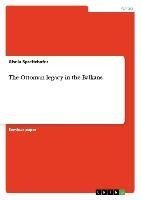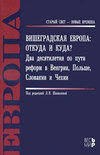
-
 Anglický jazyk
Anglický jazyk
The Ottoman legacy in the Balkans
Autor: Gisela Spreitzhofer
Seminar paper from the year 2007 in the subject Politics - International Politics - Region: South East Europe, Balkans, grade: A, School of Advanced Internatl. Studies (School of Advanced International Studies (SAIS)), course: The Balkans - From Fragmentation... Viac o knihe
Na objednávku
14.43 €
bežná cena: 16.40 €
O knihe
Seminar paper from the year 2007 in the subject Politics - International Politics - Region: South East Europe, Balkans, grade: A, School of Advanced Internatl. Studies (School of Advanced International Studies (SAIS)), course: The Balkans - From Fragmentation to What?, 10 entries in the bibliography, language: English, abstract: 500 years of Ottoman sovereignty have undoubtedly left significant imprints on the Balkans. Monumental edifices and everyday words spoken in different languages are, amongst others, living testimonies of the imperial past. However, there are opposing interpretations of the Ottoman legacy. The prevailing view describes the Ottomans as alien intruders, blaming them for the Balkans' perceived backwardness, whereas others see the era more as a period of combining Turkish, Islamic, and Byzantine/Balkan traditions.
In order to avoid overgeneralizations and -simplifications, the notion of an "Ottoman legacy" has to be taken with caution for a couple of reasons. Firstly, the Ottoman empire was preceded by the Byzantine empire, which itself was the successor of the Roman empire. Consequently, some traditions wrongly ascribed to the Ottomans can be traced back as far as to the Romans. Secondly, a distinction has to be made between what of this legacy is Islamic and what Ottoman. Without any doubt, many Ottoman institutions were inherited from earlier Islamic models, but the Ottomans made their own particular contributions in many fields. Thirdly, significant regional differences within the empire need to be taken into account. Finally, in some instances the question of an Ottoman inheritance has to be extended to the broader question of imperial inheritances because particularly at the end of the Ottoman era, the Balkans were also subject to influences from the Austro-Hungarian and the Russian empire.
This paper is structured in the following manner. I would like to start by presenting two different interpretations of the Ottoman legacy. Next, I will describe some continuities from the Ottoman period that have persisted until today before rethinking historical perceptions in and about the Balkans. The following segment will deal with the extent to which the Ottoman past has contributed to Yugoslavia's disintegration in the 1990s. A conclusion will top off the paper.
- Vydavateľstvo: GRIN Verlag
- Rok vydania: 2007
- Formát: Paperback
- Rozmer: 210 x 148 mm
- Jazyk: Anglický jazyk
- ISBN: 9783638873369







 Nemecký jazyk
Nemecký jazyk 
 Ruský jazyk
Ruský jazyk 



